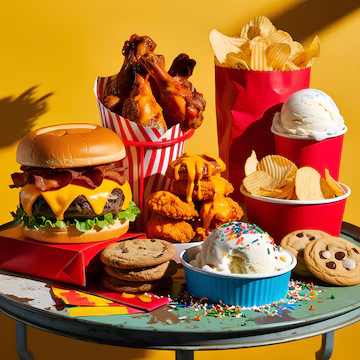FOOD ADDICTION AND OBESITY! Take control of your health today—break free from the cycle of food addiction and obesity. Reclaim your life by understanding the triggers and building a personalized approach to wellness. Every step you take is progress toward a healthier, happier you. Start your journey now; you deserve lasting change and the vibrant life that comes with it!
EATING FOR PLEASURE IS A NO! NO!
When people eat for pleasure, that is what causes food addiction. Instead of eating for pleasure, people need to eat to satisfy their hunger. When we eat for pleasure it changes the affect of the way the brain, gut, and bacteria in the gut work together. This makes it harder to control food cravings.
The body uses hormones to manage hunger and fullness, and the brain gives us a feeling of satisfaction after eating. If you eat for pleasure it will confuse the brain, causing strong food cravings, even when the body does not need it. Lifelong food choices, like eating a lot of sugary or processed foods, can lead to ongoing inflammation that makes it harder for the body to control eating.
Food addiction and obesity don’t have many medications to help with these issues. Weight-loss surgery has been the best long-term treatment so far. However, changing your eating habits, like only eating at certain times of the day every day.
Here are six steps to get a new healthier you overcome Food Addiction and Obesity
1. Take Baby Steps. Making small changes in your diet and lifestyle can improve your health as well as trim your waistline. Some suggestions from the experts:
- Each day starts with a nutritious breakfast.
- Fatigue can lead to overeating, get 8 hours of sleep each night.
- Without distractions eat your meals seated at a table.
- With your partner or family have more meals together.
- Teach yourself to eat when you are hungry and stop when you’re comfortably full.
- give up second helpings and cut your portion sizes by 20%.
- Try lower-fat dairy products.
- Make sandwiches with mustard instead of mayo and with whole-grain bread.
- Switch to cafe au lait, using strong coffee and hot skim milk instead of cream.
- Snack every few hours. or a nutritious meal.
- Use cooking spray instead of oil to reduce the fat in recipes. Use non-stick pans.
- Try different cooking methods, such as grilling, roasting, baking, or poaching.
- Drink more water and fewer sugary drinks.
- Eat smaller portions of calorie-dense foods (like casseroles and pizza) and larger portions of water-rich foods (like broth-based soups, salads, and veggies).
- instead of fatty sauces, flavor your foods with herbs, vinegar, mustard, or lemon
- Limit alcohol to 1-2 drinks per day.
2. Mindset: Pay more attention to what you eat and drink. Read the labels and pay attention to what’s in your food and drinks, You may not want to eat or drink it after you read what’s in there. When you become more aware of what you are eating, you will realize that you need to change your diet. Keeping a food diary benefits some people.
3. Make a Plan; Be Specific. Making a plan and sticking to it will help you out a lot. For example: take fruit instead of sugar snacks for breaks at work. Make yourself a schedule for every minute of the day and you will accomplish a lot more in life, instead of saying you are going to the gym, tell yourself how can I fit going to the gym in your schedule.
4. Tackle a New Mini-Goal Each Week. By taking mini steps you can achieve your goal. Here is an example: add a vegetable to your diet each week until you achieve your goal.
5. Be Realistic. On the other hand, don’t expect a drastic change over the journey to losing weight. You did not gain all your weight overnight. Remember you are what you eat and slow and steady wins the race.
6. Practice Stress Management. Stress can play a big part in weight gain. So this means you need to focus on dealing with stress by exercising, relaxation, and meditation. However, don’t fall back to overeating to deal with stress.
In conclusion, food addiction and obesity are interwoven issues that go beyond simple dietary choices. Food addiction, characterized by cravings and a loss of control over eating certain types of foods, contributes to obesity. Addressing these issues with an approach that includes education, behavioral therapy, medical interventions, and supportive social structures that promote healthier eating habits. Meanwhile, we can work toward reducing the impact of food addiction and obesity on individuals and communities alike. This article is for reference only, everyone’s bodies are not the same so work with your doctor or dietician
We can all help make this a better place with the “Pay It Forward” gesture we will teach you how. CONTACT US
.
.


